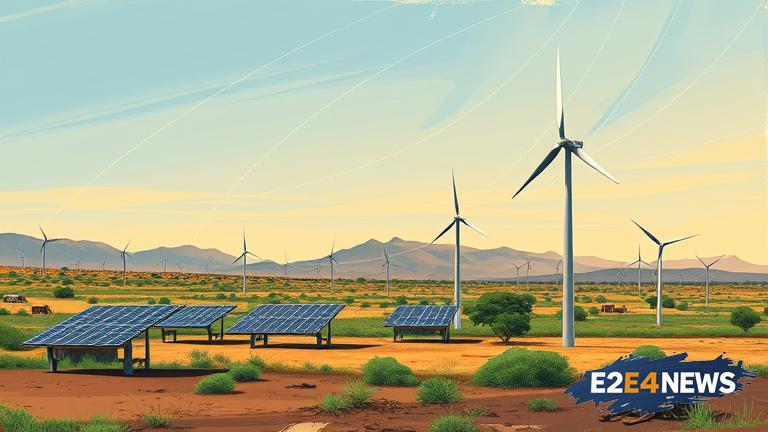The African continent is witnessing a significant shift towards renewable energy, driven by the need to address the pressing issues of energy access, energy security, and climate change. With many countries still struggling to provide reliable and affordable electricity to their citizens, renewable energy has emerged as a viable solution. Solar and wind power, in particular, have become increasingly popular due to their abundance and decreasing costs. In recent years, several African countries have launched ambitious renewable energy targets, aiming to increase their share of clean energy in the overall energy mix. For instance, South Africa has set a target of generating 42% of its electricity from renewable sources by 2030, while Morocco aims to produce 52% of its energy from renewables by the same year. Egypt, too, has announced plans to generate 20% of its electricity from renewable sources by 2022. The growth of renewable energy in Africa has been driven by a combination of factors, including declining technology costs, improved energy storage systems, and innovative financing models. Additionally, international cooperation and investment have played a crucial role in supporting the development of renewable energy projects across the continent. The African Union’s Agenda 2063, which emphasizes the importance of sustainable energy development, has also provided a framework for countries to work together towards a common goal. Furthermore, the African Development Bank has launched several initiatives to support the growth of renewable energy, including the New Deal on Energy for Africa, which aims to achieve universal access to energy by 2025. Despite the progress made, however, significant challenges remain, including the lack of infrastructure, limited access to financing, and inadequate policy frameworks. To overcome these hurdles, African countries will need to continue to invest in grid expansion, energy storage, and transmission infrastructure, while also implementing policies that support the development of renewable energy. Moreover, international partners will need to provide sustained support, including technical assistance, capacity building, and investment. The private sector, too, has a critical role to play in driving the growth of renewable energy in Africa, through investment, innovation, and technology transfer. As the continent continues to urbanize and industrialize, the demand for energy is likely to increase, making it essential to prioritize renewable energy development. In conclusion, Africa’s renewable energy revolution is gaining momentum, driven by a combination of technological, economic, and political factors. While challenges remain, the potential benefits of renewable energy, including improved energy access, reduced greenhouse gas emissions, and enhanced energy security, make it an essential component of the continent’s sustainable development strategy. With continued investment, innovation, and cooperation, Africa can unlock its vast renewable energy potential, driving economic growth, reducing poverty, and promoting a cleaner, healthier environment for future generations. The development of renewable energy in Africa is a complex and multifaceted issue, requiring a coordinated approach that involves governments, international organizations, the private sector, and civil society. By working together, African countries can create a sustainable energy future, one that is powered by clean, reliable, and affordable energy. The time to act is now, and the benefits of renewable energy are clear. As the world continues to grapple with the challenges of climate change, energy poverty, and sustainable development, Africa’s renewable energy revolution offers a beacon of hope, demonstrating that a cleaner, greener future is possible. With its vast natural resources, innovative spirit, and growing economies, Africa is poised to become a leader in the global transition to renewable energy, driving growth, reducing emissions, and improving the lives of millions of people across the continent.





